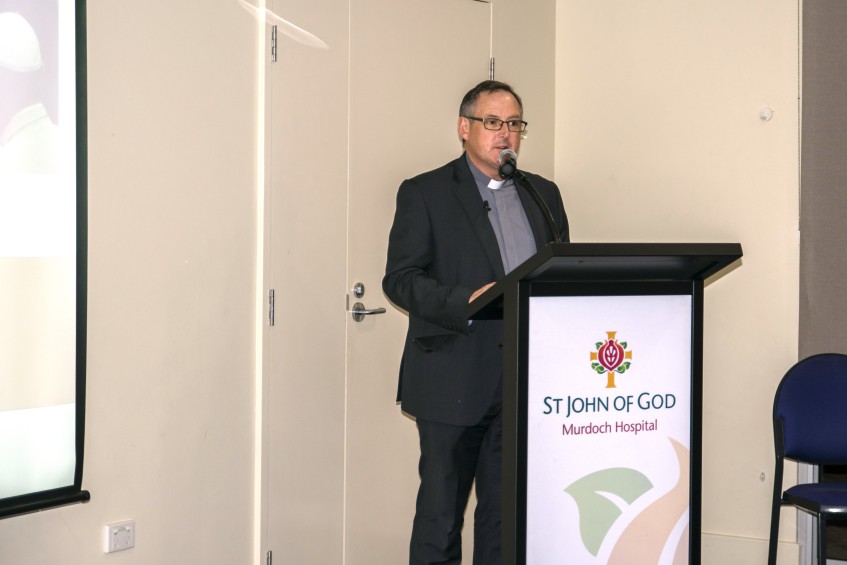Visiting Professor explains intricacies of ‘Amoris Laetitia’

Pope Francis’ teachings on love in his exhortation, Amoris Laetitia, are guided by his wider focus on mercy and compassion, but reinforce the pivotal role of marriage and family in the Catholic Church, Irish theologian Eamonn Conway told attendees at a recent lecture. Photo: Caroline Smith.
By Caroline Smith
Pope Francis’ teachings on love in his exhortation, Amoris Laetitia, are guided by his wider focus on mercy and compassion, but reinforce the pivotal role of marriage and family in the Catholic Church, Irish theologian Professor Eamonn Conway told attendees at a recent lecture.
“I consider Amoris Laetitia to be all part of Pope Francis’ charter of mercy,” Prof Conway said.
“I think had we known Pope Francis before he became elected, we would have been able to predict that his main focus would be on mercy.
Prof Conway noted that this focus allowed the Pope to explore how marriage and family had been discussed in previous Vatican writings, while at the same time addressing the needs of contemporary society.
“It’s not that at any point he sets aside past teachings on marriage, but he’s looking at what’s needed through the lens of what’s needed, and the lens of mercy.”
The presentation on Amoris Laetitia was held on Tuesday 22 August at St John of God Murdoch Hospital, and was the third of a series of lectures presented by Professor Conway through the Sisters of St John of God Visiting Scholar Program.
In the previous two lectures, Professor Conway discussed the future of the priesthood and the practical implications of Pope Francis’ encyclical on the environment, Laudato Si.
Speaking to attendees at the third lecture, he said Pope Francis was faced with a dilemma when it came to discussions of marriage and contemporary problems faced by the Church in this regard.
“The Church knows that Jesus was focusing on all 100 sheep, not just the 99. Amoris Laetitia recalls that but also says that as the Vicar of Christ, the Pope must attend to the 100, not just the 99,” Professor Conway said.
“If I were to summarise what I imagine is the dilemma that Francis finds himself in is how far do you go to safeguard one sheep without abandoning the whole flock?”
He does this by affirming the Church’s teachings on marriage as being an indissoluble union between one man and one woman, but at the same time emphasising how it reflects God’s love for humanity.
“Without first experiencing Christ’s love, the moral teaching of the Church in regard to marriage and the family is unlikely to be appealing or even to make much sense.”
Professor Eamonn Conway is Head of Theology and Religious Studies at Mary Immaculate College at the University of Limerick, Ireland, and since 2011, has been Chair of the Peter Hünermann Foundation for the Advancement of Catholic Theology in Europe.
He has held a number of appointments through the Church, including being named expert advisor to the XIII World Synod of Bishops on the New Evangelisation, joining the expert panel of the Holy See’s Agency for promoting quality assurance in Pontifical Universities and Ecclesiastical Faculties in 2014, and in 2015 being appointed to the Theology Committee of the Irish Bishops Conference on the New Evangelisation.
He was brought to Perth as part of the Sisters of St John of God Visiting Scholar Program, which invites noted scholars to visit the University of Notre Dame Australia’s Fremantle campus and provide formation opportunities through lectures and other activities.
